
In a significant development that has sent ripples through the political landscape of South Africa, Nosiviwe Mapisa-Nqakula, the former Speaker of Parliament, was arrested and subsequently released on bail amid allegations of receiving bribes amounting to approximately $135,000. The case adds to a series of corruption scandals confronting the governing African National Congress (ANC) party, casting a shadow over its governance as the country braces for national elections later this year.
Mapisa-Nqakula, who also served as the Minister of Defense between 2016 and 2019, voluntarily turned herself in to the authorities in Pretoria. Following her court appearance at the Pretoria Magistrates Court, she was released on bail set at 50,000 rand ($2,670). The charges against her are rooted in allegations that she accepted 11 cash payments from a defense contractor during her tenure as defense minister, a claim that has prompted intensive scrutiny and led to her Johannesburg home being raided by law enforcement.
Despite facing 12 counts of corruption and money laundering, Mapisa-Nqakula has maintained her innocence, suggesting that the charges levied against her are politically motivated. This assertion comes at a tense moment for South Africa, with the ANC under intense pressure to address internal corruption ahead of the impending elections.
In a bid to quell concerns over her potential flight risk, Mapisa-Nqakula assured the court of her intentions to face the allegations head-on. She highlighted the personal and financial stakes involved, including her state pension and the well-being of her children based in Johannesburg, as compelling reasons for her to remain in the country and contest the charges.
The decision by prosecutors not to oppose her bail application has paved the way for Mapisa-Nqakula's temporary release, with her case postponed to June 4. Prosecutors have also signaled their intention to expand the case by adding another defendant, indicating that the investigation is widening in scope.
This arrest underscores the ongoing challenges South Africa faces in combating corruption within its ranks, especially within the ANC. As the case unfolds, it will undoubtedly continue to attract significant attention, both domestically and internationally, given its implications for the ANC's credibility and the broader political stability of South Africa.